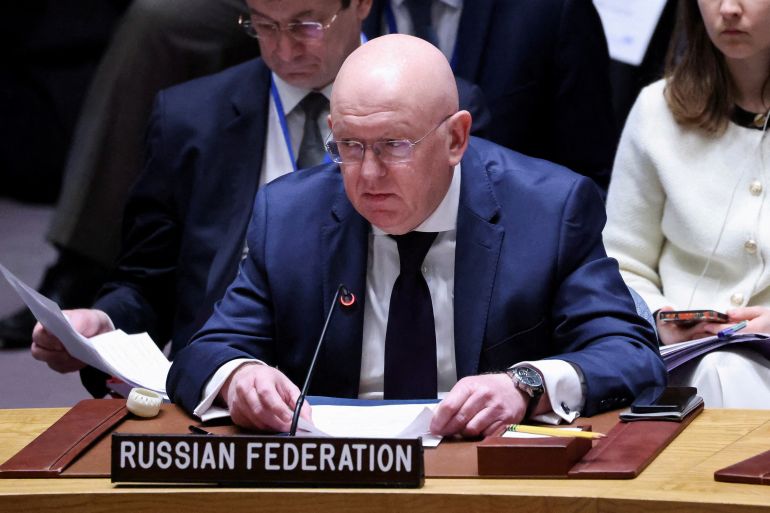Russia blocks renewal of UN panel monitoring North Korea sanctions
Sanctions, in force since 2006, will remain in place, but mandate of expert panel will end on April 30.

Russia has vetoed the United Nations’ renewal of a panel of UN experts monitoring North Korea’s compliance with international sanctions.
The Russian move follows accusations from the United States, South Korea and others that Pyongyang is supplying Moscow with weapons to use in its war in Ukraine.
Keep reading
list of 4 itemsNorth Korea claims progress in development of hypersonic missile
North Korea’s Kim oversees ‘super-large’ rocket launcher drills
North Korea fires ballistic missiles as Blinken visits Seoul
The panel, which monitors compliance with UN sanctions imposed over North Korea’s nuclear weapons and ballistic missile programmes nearly 20 years ago, said in its most recent update this month that it was investigating reports of the arms transfers.
“This is almost comparable to destroying a CCTV to avoid being caught red-handed,” South Korea’s UN ambassador, Joonkook Hwang, said of Russia’s veto.
South Korea’s foreign ministry on Friday slammed the move as an “irresponsible decision”.
Ukraine’s Foreign Minister Dmytro Kuleba, writing on social media after the veto, described the move as “a guilty plea”.
China abstained from Thursday’s vote, while the remaining 13 UN Security Council members voted in favour. On Friday, said that it opposed “blindly supporting sanctions” on North Korea.
“A political solution is the only way,” Chinese foreign ministry spokesperson Lin Jian said, when asked why Beijing abstained, adding that a “showdown at the UN Security Council is not conducive to its authority”.
“Russia’s actions today have cynically undermined international peace and security, all to advance the corrupt bargain that Moscow has struck with the DPRK,” State Department spokesman Matthew Miller said, referring to the North by its official name, the Democratic People’s Republic of Korea.
The panel reports twice a year to the Security Council and recommends action to improve the implementation of the sanctions that were first imposed in 2006 and have been gradually strengthened. Its mandate expires at the end of April.
“It is clear to us that the UN Security Council can no longer use old templates in relation to the problems of the Korean Peninsula,” said Russia’s Foreign Ministry spokesperson Maria Zakharova said on Friday.
Russia’s veto was in line with its interests, Kremlin spokesman Dmitry Peskov said.
Leif-Eric Easley, professor of international studies at Ewha Womans University in Seoul, said the veto “further demonstrates the ineffectiveness of the UN Security Council for dealing with North Korea, and blatantly shows the unwillingness of certain permanent members to meet their obligations.”
During negotiations on the draft text, Russia and China unsuccessfully pushed for it to include a requirement that the sanctions regime be renewed annually. In recent years, the two countries have called for sanctions to be eased.
Russia’s UN ambassador, Vassily Nebenzia, told the council before the vote that Western nations were trying to “strangle” North Korea and that sanctions were losing their “relevance” and becoming “detached from reality” in preventing the proliferation of nuclear weapons in the country.
He accused the panel of experts of “increasingly being reduced to playing into the hands of Western approaches, reprinting biased information and analysing newspaper headlines and poor quality photos”. Therefore, he said, it was “essentially conceding its inability to come up with sober assessments of the status of the sanctions regime”.
The panel’s most recent report was made public earlier this month and said that North Korea “continued to flout” sanctions, including by launching ballistic missiles and breaching oil import limits. As well as alleged arms shipments to Russia, the panel said it was also investigating dozens of suspected cyberattacks by North Korea that raked in $3bn for its weapons programmes.
US’s deputy UN ambassador, Robert Wood, called the panel’s work essential and accused Russia of attempting to silence its “independent objective investigations” because it “began reporting in the last year on Russia’s blatant violations of the UN Security Council resolutions”.
He warned that Russia’s veto would embolden North Korea to continue jeopardising global security through the development “of long-range ballistic missiles and sanctions evasion efforts”.
Moscow has rejected claims it is buying weapons from Pyongyang, which has continued to develop new weaponry despite the sanctions, carrying out numerous tests in recent months, including last week when it tested a solid-fuel engine for a “new-type intermediate-range hypersonic missile“.
Ahead of the vote, the US and South Korea launched a task force aimed at stopping North Korea from procuring illicit oil. Under UN sanctions, Pyongyang is limited to importing 4 million barrels of crude and 500,000 barrels of refined products a year.
“The panel, through its work to expose sanctions non-compliance, was an inconvenience for Russia,” said Britain’s UN ambassador, Barbara Woodward. “But let me be clear to Russia: The sanctions regime remains in place, and the UK remains committed to holding DPRK to account for its compliance.”
In August, Russia used its veto to end the mandate of a group of UN experts on Mali, who charged that Moscow-linked Wagner mercenaries were involved in widespread abuses.